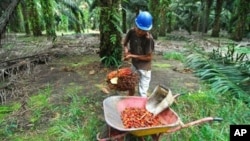Starting next year, Indonesia will impose a moratorium on new development projects in rain forest regions. It is part of a broad effort to both protect the country's vital palm oil industry, and its forests.
Indonesia is the world's third-largest producer of greenhouse gas emissions, due mostly to the burning of its vast forests. The greenhouse gases are associated with global warming.
Much of the forest is cut to make room for new palm oil crops. Global demand is rising for palm oil, used to make everything from soaps to alternative fuels. Industry officials say palm oil production employs almost two million people in Indonesia and exports bring in over $10 billion a year.
In the past, the palm oil industry has taken priority over environmental protection. That emphasis is beginning to shift.
In 2011, the government will ban forest clearing projects for two years. Indonesia's Vice Minister of Trade Mahendra Siregar said the government intends to require new sustainable farming methods.
At a forum for journalists this week, he said the government plans to require a certification process for all palm oil producers. The success of Indonesia's efforts ultimately will be judged in the marketplace, Siregar said.
"If we can see the increase of the size of the certified palm oil winning the overall palm oil market, then we would expect that the premium price or the extra recognition that would be, of course, borne by the consumers who are willing to pay extra because of the demand and the need that they request."
Siregar, along with representatives from palm oil industry and conservation organizations, gathered to discuss the moratorium, and how to balance the economy with the environment.
Environmental groups are not opposed to palm oil or economic development said Bustar Maitar from Greenpeace.
"I am repeatedly saying that Greenpeace is not anti-palm oil. This is our position. What we are anti is deforestation, because that is the key issue," said Maitar. "What we are against is the deforestation globally, not only in Indonesia"
A group of industry officials and conservationists, called the Roundtable on Sustainable Palm Oil or RSPO, has developed a voluntary certification process. RSPO's Vengeta Rao said the certification can be used to promote companies and products that are environmentally responsible.
"Users of palm oil are to commit to using palm that has been sustainably produced," Rao emphasized. "Producers have to commit to being, to producing, it sustainably, and the rest of the support structure whether it is investment houses or civil societies will have to lend their efforts to promote either the production or the consumption of oil that is better produced than a significant quantity of what is being produced now."
While environmentalists applaud the new efforts, they also say that palm oil companies are rushing to buy as much land as possible for development before the moratorium goes into effect.
Indonesia Plans Forest-Cutting Moratorium to Protect Palm Oil Industry
- By Brian Padden





